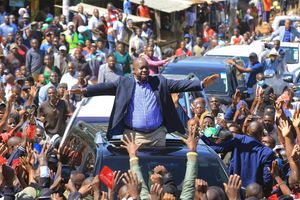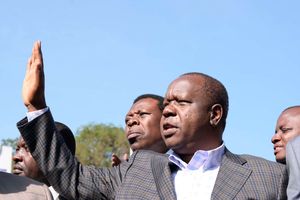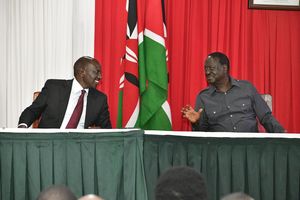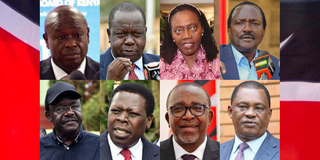
Top row: Rigathi Gachagua, Fred Matiang'i, Martha Karua and Kalonzo Musyoka. Bottom row: Mukhisa Kituyi, Eugene Wamalwa, Mithika Linturi and Justin Muturi.
On Tuesday this week, an improbable political gathering unfolded in Nairobi. Former Deputy President Rigathi Gachagua, ex-Vice President Kalonzo Musyoka, one-time Interior Cabinet Secretary Fred Matiang’i, and 2022 Azimio running mate Martha Karua sat alongside former ministers Justin Muturi and Mithika Linturi, DAP-K leader Eugene Wamalwa and ex-United Nations official Mukhisa Kituyi.
Their mission? To forge a united front against Ruto’s administration. Critics, especially on social media, labelled them the “same old” from the stock of archetypal Kenyan politicians and pointed out the lack of younger faces.
But the stakes could not be higher. The economy is highly strained, and the Finance Bill 2024 protests painted a crystal-clear picture that needs no interpretation. Corruption, the nation’s perennial scourge that stretches from the national to county governments, has siphoned billions from public coffers and the public demands a practical and lasting solution. In a nutshell, the discontent is widespread.
Analysts say the political formation’s ability to present a coherent economic plan—not just anti-Ruto vitriol—will determine its viability, going by the numerous online comments that greeted the Tuesday’s meeting.
Against this backdrop, a coalition of former powerbrokers — most of whom were previously ingrained into what is largely seen as a flawed system— has emerged to challenge President William Ruto in 2027.
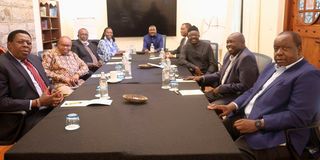
From left: Eugene Wamalwa (DAP-K), Jubilee Party's Torome Saitoti, Mr Mithika Linturi, People's Liberation Party boss Martha Karua, Wiper party leader Kalonzo Musyoka, Mr Justin Muturi, Dr Mukhisa Kituyi, former Deputy President Rigathi Gachagua and Dr Fred Matiang'i during a meeting in Nairobi on April 29, 2025.
The budding alliance’s biggest challenge is to convince the public that it is a credible alternative to the Ruto administration given that many of its members were architects of the systems they now decry.
They brand themselves as liberators, but while they come with extensive political and public service experience, the checkered past of key players in the nascent formation presents a dilemma: Are they Kenya’s potential saviours or merely opportunists capitalising on a nation’s despair?
Mr Gachagua — he of a government of shareholders, impeached in October 2024 after a dramatic fall from grace and criticised as an ethnic exclusionist only concerned about Mt Kenya — struck a reformist, if defiant, tone. “The team to liberate Kenya gets bigger every day,” said the self-styled “truthful man,” who is still fighting his impeachment in court.
Damascus moment
Mr Gachagua was the co-chief architect of the Kenya Kwanza administration, whose unpopular policies he defended for two years after coming into office as Deputy President. The Damascus moment for the former provincial administrator only came after the 2024 impeachment following a spectacular fallout with his boss and he has since declared himself a reformist, who remains a vocal critic of the Ruto administration. However, he is struggling to shed off his “ethnic kingpin” label as he champions Mt Kenya interests.
The other senior leader in the group is Kalonzo. A political survivor from the Daniel Moi era, Mr Musyoka’s critics have often pointed to the serial indecisiveness that over the years earned him the nickname “watermelon.” He was expected to run for President in 2013 and 2017 but ended up being in the losing ticket as Mr Raila Odinga’s running mate 2017. Then 2022 was considered his time, 18 years after his failed presidential bid that eventually led him to the Mwai Kibaki side of the Grand Coalition government, but once again he capitulated to Mr Odinga’s charm in the Azimio formation even without being made second in command. What cards he will play this time remain the big question even as critics question whether he can rally support beyond his Ukambani base in which he has a stranglehold.
Mr Linturi’s fertiliser scandal when he was Agriculture Cabinet Secretary before the President Ruto dissolved his top team in July last year remains a stain, just as the many legal challenges that have played out publicly. During the failed attempt to impeach him, dissenting MPs like Opiyo Wandayi and Otiende Amollo lambasted colleagues who shielded him declaring that “Linturi was at the centre of the scandal.” The former Igembe South MP, who failed in his bid to be Meru Governor in 2022, has always maintained his innocence.
On his part, Dr Matiang’i, during a rally in Kisii on Friday, declared: “I have come home to explain how we will talk to others about the affairs of our country.”

Top leaders meet in Nairobi to shape opposition ahead of 2027
Yet, his tenure as a Cabinet Secretary in President Uhuru Kenyatta’s administration—most prominently in the Interior ministry—remains deeply divisive. In particular, the conduct of the security agencies during his tenure and failure to obey court orders, including in Dr Miguna Miguna’s deportation case, leave many unanswered questions.
Ms Karua, though largely considered to have no integrity problems, lacks a track record of economic stewardship. Observers say her 2013 presidential manifesto was heavy on ideals but light on actionable policies. The failure to deliver the Mt Kenya vote when she was picked as Mr Odinga’s running mate also raises questions about her influence and mobilisation abilities.
As for Mr Muturi, another vocal critic who was only recently sacked as Public Service Cabinet, his tenure as Attorney General and Ruto insider will continue to stir questions.
DAP-K leader Eugene Wamalwa, is dismissed by his critics as a lightweight in Western Kenya politics despite being a Cabinet Secretary in President Uhuru Kenyatta’s administration, while Mukhisa Kituyi is yet to rebuild his political credibility after his 2022 presidential ambitions collapsed before it even got off the ground.
Yet critics have been swift to dismantle the liberation and change rhetoric. Former Kanu Secretary-General Nick Salat dismissed the group as relics of past regimes
“How are they liberators when they are still the same people who have been part and parcel of successive regimes? These are people suffering from the hangover of state power they now miss.”
Kenya’s disillusioned youth—who led 2024’s anti-government protests—are conspicuously absent from this old guard’s revival. Their demand for accountability and fresh faces clashes with the coalition’s recycled roster.
“Where are the youth in that team?” Mr Salat asked.
Despite mounting challenges, the group of prominent Kenyan politicians has vowed to intensify consultative meetings in the coming weeks and months, signalling a potential consolidation of opposition forces.
However, whether this alliance evolves into a credible political movement—or collapses under the weight of its members’ controversial pasts—remains uncertain. Their success hinges not only on strategy but also on public perceptions of redemption, reinvention, and resistance.
The coalition insists it represents a new dawn. Yet, the burden of history looms large. Dr Matiang’i’s strongman reputation, Mr Gachagua’s impeachment burden, Mr Musyoka’s indecisiveness, Mr Linturi’s troubles, and Ms Karua’s questionable ground game are indelible political stains.
Each leader carries significant political baggage, raising questions about their credibility as champions of reform. Below is an examination of their records and the controversies that may define their opposition ambitions.
Rigathi Gachagua: A fallen kingmaker
Once President William Ruto’s staunchest ally and admittedly an excellent mobiliser, Mr Gachagua’s political fortunes plummeted after his impeachment in 2024. His undoing was partly self-inflicted, marked by inflammatory rhetoric often interpreted as ethnic. His infamous "shareholding" analogy—framing government as a business where certain communities hold majority stakes—alienated many.
Now positioning himself as a populist outsider, Mr Gachagua faces scepticism. Critics, including Nakuru Governor Susan Kihika, dismiss his claims to the Mt. Kenya vote as merely opportunistic.
“Gachagua lies frequently that he made Mt Kenya people vote for Ruto. All of us who on in the Mountain made Mt Kenya people vote for Ruto,” she charged in a recent interview and said that Mr Gachagua’s foray will be short-lived.
Fred Matiang’i: A legacy of contradictions
Matiang’i, a former Interior Cabinet Secretary, is remembered both for his administrative efficiency and the controversies that marred his tenure. The Ruaraka land saga—where he allegedly ignored reports confirming public ownership of disputed school land—remains unresolved.
More damning were the revelations of bodies dumped in River Yala during his tenure, fuelling accusations that the administration had given a nod to extrajudicial killings. His potential opposition role now invites scrutiny, particularly given the current administration’s similar allegations of abductions.
“I am ready to be President of Kenya,” Matiang’i declared in Kisii on Friday where he was accompanied by local leaders as the crowd erupted in cheers.
Few may remember that he was the Chief Campaigner for political titan Simeon Nyachae in the 2002 presidential race. Mr Nyachae finished third, having garnered 6.5 per cent of the presidential vote coming behind Mwai Kibaki (61.3 per cent) and Uhuru Kenyatta (31.6 per cent). Whether Matiang’i, who has himself never run for political office, has since developed a sharper political acumen remains to be seen.
Kalonzo Musyoka: The perennial number two
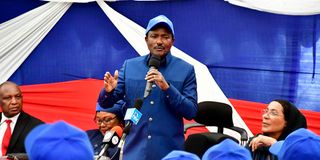
Wiper Party leader Kalonzo Musyoka addressing party delegates at Wiper House on April 24, 2025.
Mr Musyoka’s political career has been defined by indecision, earning him the moniker "watermelon" for his shifting allegiances. Despite his 2007 presidential bid and two failed runs as Mr Raila Odinga’s deputy in 2013 and 2017, he retains a loyal base in Lower Eastern and parts of the Coast.
Yet, his history of coalition-hopping raises doubts about his commitment to sustained opposition. Will this change ahead of 2027?
Martha Karua: Lacklustre running mate
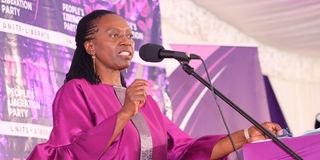
People's Liberation Party leader Martha Karua delivers her speech during the party's launch in Nairobi on February 27, 2025.
Ms Karua’s role as President Mwai Kibaki’s tallying agent during the disputed 2007 election continues to haunt her. The hurried swearing-in of Mr Kibaki — amidst widespread violence — remains a stain on her record. While she has consistently defended the move as constitutional, questions remain.
Her inability to deliver Mt Kenya votes for Raila Odinga in 2022 further undermines claims of grassroots influence.
Justin Muturi: Mr Fixer, sir
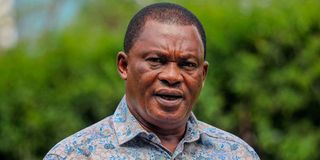
Former CS Justin Muturi.
Mr Muturi’s tenure as National Assembly Speaker was marred by accusations of bias, particularly in fast-tracking contentious election laws. Senior Counsel Ahmednasir Abdullahi once described his leadership of the National Assembly as "calamitous."
President Ruto has since accused him of incompetence as Attorney General—a charge Muturi dismisses as baseless. He was recently kicked out of the Ruto government after falling out acrimoniously with his erstwhile boss, who he accused of refusal to bring the issue of abductions before Cabinet.
Mithika Linturi: Fertiliser scandal questions

Former Agriculture Cabinet Secretary Mithika Linturi.
As Agriculture Cabinet Secretary, Mithika Linturi presided over one of the most damaging scandals in recent memory: the distribution of counterfeit fertiliser masquerading as government-subsidised produce. The scheme, facilitated through National Cereals and Produce Board (NCPB) depots, defrauded thousands of farmers who relied on the state’s assurance of quality.
Public outrage was swift. A May 2023 TIFA poll revealed that 52 per cent of Kenyans held Mr Linturi primarily accountable for the dubious fertiliser, even as investigations unfolded. The scandal’s political fallout grew so severe that it nearly cost him his job.
A parliamentary special committee narrowly voted against impeaching him, but the decision split the House. Four dissenting MPs—Opiyo Wandayi (Ugunja), Otiende Amollo (Rarieda), Irene Mayaka (nominated), and Junet Mohamed (Suna East)—issued a scathing minority report, asserting that Linturi was "at the centre of the scandal." Their critique painted a picture of systemic negligence, if not complicity.
The episode left lasting questions: Was Linturi a hapless administrator overwhelmed by graft, or did his oversight failures enable the fraud? For farmers who planted their hopes—and seeds—with the tainted fertiliser, the answer may already be clear. His many public legal battles have also remained a political stain.
Eugene Wamalwa: Big brother’s shadow
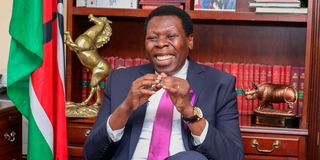
DAP-K Party Leader Eugene Wamalwa.
Critics argue Mr Wamalwa’s political relevance stems largely from his late brother, former Vice President Michael Kijana Wamalwa. His ability to galvanise support – especially when push comes to shove and the General Election fever rises - remains questionable despite years of fighting to be his own man. The next elections will be a defining moment for him to finally deliver the goods.
Mukhisa Kituyi: Presidential bid that never was
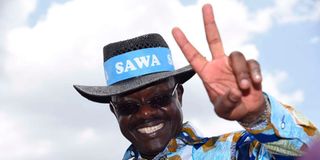
Dr Mukhisa Kituyi.
Mukhisa Kituyi’s reputation as a brilliant policy architect and globally respected diplomat—forged during his tenure as Trade Minister under Kibaki’s Rainbow Coalition—once made him a natural presidential contender. His intellectual heft and administrative record positioned him as a rare figure capable of bridging technocratic governance and political ambition.
Yet, his 2022 presidential bid unravelled abruptly when a widely circulated video, allegedly depicting him in a compromising situation, dominated public discourse. The footage, whose authenticity was never formally challenged, overshadowed his campaign and alienated key backers—including allies of then-President Uhuru Kenyatta.
Kituyi’s terse rebuttal— “I don’t want to lower the debate of my candidature below my neck”—did little to quell the storm. The remark, though dismissive, underscored a deeper tension: Can a leader’s past achievements outweigh a single scandal’s gravitational pull? For Kituyi, the answer, at least in 2022, appeared to be no.
The episode left an indelible mark on his political trajectory, raising questions about whether Kenya’s electorate prioritises personal conduct over professional legacy—and whether redemption remains possible for fallen giants.


